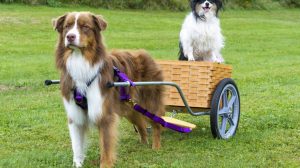Training the Weimaraner is for experienced dog owners who are familiar with the unique needs of the hunting dog. Read here what you need to consider if you want to train and employ a Weimaraner.

When raising a Weimaraner, balancing things and housing conditions is essential. The clever, beautiful dog with the silver-grey fur and the magnetic eyes should be raised non-violently, like all dogs, but very consistently and always get a lot of species-appropriate workloads. His tendency to stubborn behavior requires a clear, composed, and firm owner who knows exactly what he is doing.
Weimaraner: Peculiarities in training
The Weimaraner was bred as a hunting dog, specifically a pointing dog. These are so-called full-time dogs, which stand by the hunter in the field, water, and the forest and pick up tracks. In addition, the Weimaraner is said to have an excellent natural sharpness, which means that he is very alert, does not shy away from necessary fighting, and is therefore suitable as a protection dog. This does not mean that the Weimaraner is aggressive or vicious, but they can become so if not exercised according to their instincts and hunting dog disposition. It does not necessarily have to be used for hunting, but it needs sufficient employment that corresponds to its actual vocation.
The Weimaraner needs to be well socialized as a puppy and given plenty of daily activities to get along well with other dogs. It is essential to ensure that his hunting instinct never becomes independent. When you work with him, you should also always remember that this dog does not tolerate hardness and violence. Proceeding carefully, lovingly, and mindfully is always the right way with him. Be patient, clear in your instructions, and always a confident caregiver for your dog. With the proper training, Weimaraners are loyal companions, sweet and affectionate, ready to defend their “family” against attackers.
Employment for the Weimaraner
If the primary conditions are right, the Weimaraner learns quickly because he is brilliant. He does so well in training, for example, as a search dog. Spotting games and nose work are great ways to keep this fascinating breed of dog occupied if you don’t want to keep them as a hunting dog. In addition, many exercises are indispensable for the active dog, for example, as a companion dog. If the Weimaraner can neither live out his intelligence nor his urge to move, he quickly comes up with other, probably undesirable ideas to keep himself busy. For example, he can develop aggression towards conspecifics or other pets.
Weimaraners are not suitable as pure companion dogs or pure family dogs. As working dogs, they are working animals who feel underwhelmed by a large garden and long walks alone. You should, therefore, always include search games during your hikes. Even occasional agility training alone is not enough to adequately satisfy his needs and promote his talents. Training as a working dog suits him particularly well. Also, don’t be afraid to hire a professional dog trainer to help you train the Weimaraner and give you tips on which dog sports are suitable for your four-legged friend.








